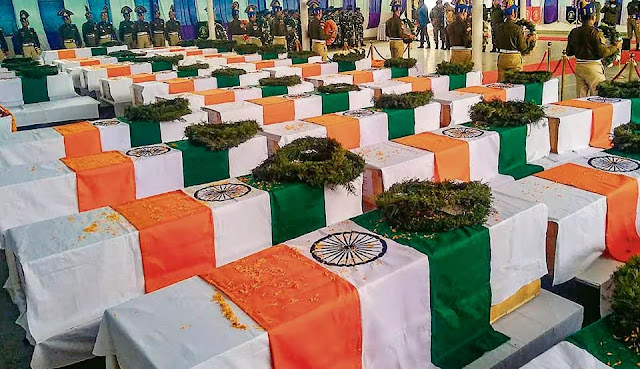Pulwama Attack: Remembering the Tragedy and Pursuing Peace
Introduction:
On February 14, 2019, a devastating terrorist attack targeted a convoy of Indian paramilitary personnel in Pulwama, Jammu and Kashmir. The attack, orchestrated by a Pakistan-based militant group, resulted in the loss of 40 lives and heightened tensions between India and Pakistan. This article delves into the events leading up to the Pulwama attack, its immediate aftermath, and the broader implications for regional security. While remembering the victims and their families, it also explores the imperative of fostering dialogue, addressing root causes, and pursuing peace in the troubled region.
Body:
The Pulwama Attack: Background and Timeline:
The Pulwama attack unfolded when a suicide bomber targeted a convoy of Indian paramilitary forces. The attacker, a member of the militant group Jaish-e-Mohammed, drove an explosive-laden vehicle into the convoy, resulting in a tragic loss of lives. The attack sent shockwaves through the region and beyond, prompting widespread condemnation.
Responsibility and International Reactions:
Jaish-e-Mohammed claimed responsibility for the attack, raising concerns about the role of militant groups operating from Pakistani soil. The international community, including the United Nations, condemned the act of terrorism, urging restraint and diplomatic solutions to prevent further escalation between India and Pakistan.
Escalation of Tensions: Military Responses:
In the aftermath of the Pulwama attack, India conducted airstrikes targeting what it identified as terrorist training camps in Pakistani territory. Tensions escalated rapidly, with fears of a military conflict between the two nuclear-armed neighbors. The situation underscored the fragility of the security landscape in the region.
Diplomatic Efforts and Global Concerns:
Diplomatic channels were activated to de-escalate tensions, with international leaders urging dialogue and restraint. The incident drew attention to the longstanding Kashmir dispute and highlighted the need for addressing root causes of regional instability. The global community emphasized the importance of preventing further violence and finding diplomatic solutions to longstanding conflicts.
Impact on Regional Security Dynamics:
The Pulwama attack had a profound impact on the security dynamics of the region. It heightened existing tensions between India and Pakistan, both nuclear-armed nations, and underscored the challenges posed by cross-border terrorism. The incident brought renewed focus on the need for cooperative efforts to combat extremism and ensure stability in the South Asian region.
Human Cost and the Lives Affected:
Beyond geopolitical considerations, the Pulwama attack had a deeply human cost. The loss of 40 lives in the convoy, consisting mostly of young paramilitary personnel, left families shattered and communities mourning. The attack highlighted the personal toll of terrorism and underscored the urgency of finding lasting solutions to prevent such tragedies in the future.
Addressing Root Causes and Promoting Peace:
To achieve lasting peace, addressing the root causes of regional tensions is essential. This involves comprehensive efforts to engage in meaningful dialogue, address longstanding disputes, and promote socio-economic development. The international community has a role in encouraging both India and Pakistan to seek diplomatic solutions and work towards fostering stability in the region.
The Role of International Mediation:
International mediation efforts can play a crucial role in facilitating dialogue between India and Pakistan. Mediators can help create an environment conducive to productive negotiations, encouraging both nations to find common ground and move towards resolving contentious issues. The United Nations and other diplomatic entities can contribute to building trust and promoting sustainable peace.
Conclusion:
The Pulwama attack remains a tragic chapter in the complex history of the South Asian region. Remembering the victims, acknowledging the human cost, and learning from the events of that day are crucial steps towards building a more secure and peaceful future. Pursuing diplomatic solutions and addressing root causes must be prioritized to prevent such incidents and pave the way for lasting peace.




Comments
Post a Comment